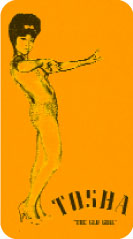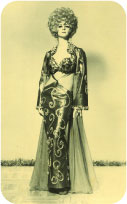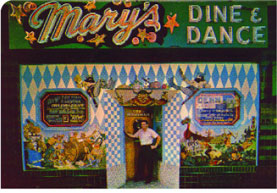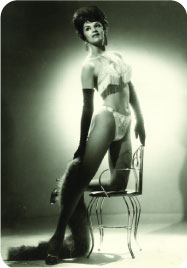As I walked
with Vicki through the fluorescent lit hallway
to interview her father, images of an aging
pimp were flashing through my head. I was expecting
an old man with slicked back silver hair, a
cobalt blue leisure suit with matching shoes,
and a pinky ring... the zipper pulled down on
the front of his jacket to reveal braided white
chest hair. I've watched way too many mobster
films. Roy Keller was the opposite of that image.
I had heard stories about him since the day
I started working at Mary's Club. When we entered
the room, Roy was lying in his metal hospital
bed. I hid behind Vicki, peeking around her
shoulder to get a look at this guy. He was so
delicate but dignified; his silver hair stood
out on his red silk pillowcase and his kind
smile put me immediately at ease.
Roy
Keller has owned Mary's Club, Portland's oldest
strip bar, for over fifty years. His daughter Vicki manages
Mary's. His granddaughters Traci and Virginia
work the bar, floor and stage. Pictures of his
numerous great-grandkids adorn the cash registers.
Mary's gives new meaning to family-run establishment.
It's the heart and soul of the Portland strip
scene.
over fifty years. His daughter Vicki manages
Mary's. His granddaughters Traci and Virginia
work the bar, floor and stage. Pictures of his
numerous great-grandkids adorn the cash registers.
Mary's gives new meaning to family-run establishment.
It's the heart and soul of the Portland strip
scene.
Roy bought Mary's in 1954 from a detective and
his wife who were getting a divorce and didn't
know how to divide the business, so they sold
it and split the profit. The detective's wife
was named Mary. It was a piano bar at the time.
Roy kept it a piano bar for a few years with its
built-in clientele. He kept the name because a
large percent of his clientele were longshoremen
who would get off the boat, hop in a cab and say
to the cabby, "Take me to Mary's." He was a smart
businessman and knew better than to change the
name. The longshoreman would stay at the hotel
that is still upstairs from Mary's, so Mary's
was their living room when they were in town.
Roy commissioned an artist to paint scenes of
longshoremen on the walls in their honor. The
brightly colored murals stretch the length of
the club, and feature Mt. Hood, a Chinatown scene
and a reclining topless woman in Egyptian princess
finery. The longshoremen were regulars when they
were in town and Roy assumed that they would like
a strip club. However, as soon as Mary's turned
into a strip bar, their attendance began to dwindle.
Mary's soon changed from a hangout for longshoremen
with a mild mannered piano player to a place with
go-go dancers, strippers, transvestites and boa
constrictors.
When Roy decided to make Mary's a strip club in
1965, it was a quick decision. The piano thing
wasn't really working out for him. It wasn't filling
the house. He got the idea from a friend of his
who owned Big Al's, a strip club in San Francisco.
Big Al's was always busy and that is eventually
where one of the first dancers came from. Opening
a strip club was a scandalous revolution at the
time. Everyone thought Roy was crazy. He had no
idea "if it would go," he said. Not only did it
go, it paved the road for all the clubs standing
today in Portland.
Roy tried to get out of the contract he had with
the piano player but couldn't, so he started having
a dancing girl between each piano set. When lines
started forming around the block for the intermission
entertainment, the piano man packed up of his
own accord.
Roy assumed that the longshoremen would love a
strip club, but  they
didn't seem to, although he wasn't sure if they
didn't like the girls or the drink prices going
up, which happened at the same time. He never
figured out why he lost their business. Yet the
murals he commissioned in their honor live on,
whispering stories of a world that can now only
be imagined, a world with pirates that seems as
vague in relevance as the murals themselves hanging
on the walls of the fifty year old strip club.
Somehow the images evoke a fairytale world. Amazing
how time makes fiction out of memories.
they
didn't seem to, although he wasn't sure if they
didn't like the girls or the drink prices going
up, which happened at the same time. He never
figured out why he lost their business. Yet the
murals he commissioned in their honor live on,
whispering stories of a world that can now only
be imagined, a world with pirates that seems as
vague in relevance as the murals themselves hanging
on the walls of the fifty year old strip club.
Somehow the images evoke a fairytale world. Amazing
how time makes fiction out of memories.
Bambi Darling, Tasha and September Rose were some
of the first strippers. There was a transvestite
MC who helped keep the crowd entertained between
sets. His name was Brandy Scott. He would paint
half of his face like a woman's and the other
half like a man's. Eventually he became a she
and started stripping--at Mary's. There was also
Wally who owned Wally's Place--a store next to
Mary's--and would make the girls g-strings and
also entertain the crowd by smoking spoons and
eating cigarettes.
People's attention spans were much longer then.
The customers would come to see the strippers
but were also there for the show. And what a show
they got. A transvestite MC, telling jokes and
prancing on stage until the go-go dancers were
ready to bee-bop to Ray Charles's "I Got A Woman."
One girl had a boa constrictor, which got lost
in the basement and found by the beer delivery
guy, who shit his pants when the snake slithered
from the rafters of the cooler to say hello. The
boa then made its way into the sewers of downtown
from a hole in the basement. "Was he ever found?"
I  asked
Roy. He smiled. "Eventually, I think."
asked
Roy. He smiled. "Eventually, I think."
Tasha was the first stripper. She moved up from
San Francisco and lived in the hotel above the
club. Roy said he used to go to her room and get
her when it was time for her to go on stage. Vicki
interrupted him to say there were lines around
the block to get in. Roy kinda smiled and said,
"I would escort Tasha through the crowd for each
performance." It was a burlesque performance.
By law girls could not get naked, so the dancers
had extravagant costumes and would take an article
of clothing off for each song. They would dance
to three or four songs and, just like today, would
pick their own music from the jukebox. Tasha would
strip down to her g-string and pasties.
Roy's son Jerry ran Mary's for a few years, and
in the late seventies his daughter Vicki moved
from California,
where
she managed a honky-tonk bar Roy owned, to manage
Mary's. She still runs it. She is an amazing
woman, as tough as she is sweet. Every woman
who works there swears it is the best place
in town to dance. The dancers are treated with
respect by Vicki, the staff and all our cool
regulars. Mary's is not at all your typical
strip club--it's a family run business, which
adds to its mysteriously nurturing charm.
Its décor hasn't changed much in fifty
years; it is small and dimly lit. An old sixties
TV is embedded in the wall between the neon
beer signs above the restrooms. It probably
hasn't worked in forty years. Mary's atmosphere
is a character in and of itself. I can't stand
it when people walk in and say, "This place
sucks. What a dump." Those people obviously
lack taste and imagination. The first time I
walked into Mary's, I said to myself, "This
is the coolest bar and I wanna work here." The
place is oozing with stories, characters, history
and personality. It may be a dive, but who needs
new furniture and new paint when you've got
great music, liquor, and--hello--beautiful naked
women?
One of the things I was dying to know was what
the tipping standard was back then. Was it nickels,
dimes and--for the big spenders--quarters? Because
today the average is a dollar a song. So I asked
Roy. "How much did guys tip then? Did they tip
change?" He laughed for a long second and said
with a big smile on his face, "Yes, some guys
would throw change on stage and the girls would
throw it right back at them." He paused for
a second, "A dollar a song was the norm I guess."

It's comforting to know everything has changed
but nothing has changed. If you throw change
at a stripper today at Mary's, be prepared for
public humiliation and hopefully a scar from
where the quarter welts your face. The stories
Roy told me are endless and helping my book
write itself, as are the stories of any day
at Mary's. Any of us who works there could fill
manuscript after manuscript because the club
seems to be a magnet for all walks of humanity.
I don't know if that is typical of strip clubs,
but I do know that Mary's is a piece of history
and, I think, the best club in town. Before
I met Roy I liked working at Mary's, but after
meeting him I'm proud to be working at Mary's.
As we were leaving his room, I said to him,
"Thank you so much Roy. It was so nice to meet
you." He grabbed my hand, kissed it and said,
"Thank you for helping Vicki." Call me a sentimental
fool but who wouldn't be proud to work for a
man like that?
Julie Gallagher has worked at Mary's for one
year. This article contains excerpts from her
upcoming book.





